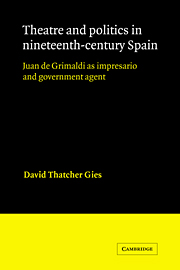 Theatre and Politics in Nineteenth-Century Spain
Theatre and Politics in Nineteenth-Century Spain Published online by Cambridge University Press: 05 May 2010
Grimaldi's passion and brilliance were not limited to his theatrical endeavors. Two other areas, journalism and contemporary political history, occupied much of his time and attention, and his work in them would play a formative role in the shaping of contemporary views of Spanish society. He learned early – perhaps from Carnerero's example – that the press had enormous power to influence thought and he used that knowledge effectively. Grimaldi wrote newspaper articles at three dramatic junctures of Spanish history (1833–6, 1840, 1867) and his writings were read and hotly debated on both sides of the Pyrenees.
María Cristina, Mendizábal and “La Revista Española” (1833–6)
Carnerero ceased the publication of his Cartas Españolas in the beginning of November 1832. One week later they reappeared with a new title, a new format and a new board of editors (composed of Carnerero and his brother, Antonio Alcala Galiano, N. Campuzano, N. Rodrigo and Juan de Grimaldi). La Revista Española, destined to become one of the most influential newspapers of the Romantic period, began publication on November 7. It originally was published as a biweekly, then increased to three times per week, and finally on April 1, 1834, encouraged by additional freedoms in the capital (and by additional competition), it began its life as a daily. It appealed to liberal intellectuals who found in its pages stimulating commentary on contemporary issues (as much as was permitted) and the best literary section of any of the capital's papers.
To save this book to your Kindle, first ensure [email protected] is added to your Approved Personal Document E-mail List under your Personal Document Settings on the Manage Your Content and Devices page of your Amazon account. Then enter the ‘name’ part of your Kindle email address below. Find out more about saving to your Kindle.
Note you can select to save to either the @free.kindle.com or @kindle.com variations. ‘@free.kindle.com’ emails are free but can only be saved to your device when it is connected to wi-fi. ‘@kindle.com’ emails can be delivered even when you are not connected to wi-fi, but note that service fees apply.
Find out more about the Kindle Personal Document Service.
To save content items to your account, please confirm that you agree to abide by our usage policies. If this is the first time you use this feature, you will be asked to authorise Cambridge Core to connect with your account. Find out more about saving content to Dropbox.
To save content items to your account, please confirm that you agree to abide by our usage policies. If this is the first time you use this feature, you will be asked to authorise Cambridge Core to connect with your account. Find out more about saving content to Google Drive.